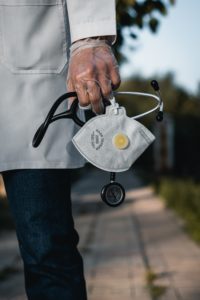Algemeiner Quotes IDF BG Dr. Tarif Bader During JINSA Conference Call
Fights Against Coronavirus Tantamout to Global War, Head of IDF Medical Corps says
by Benjamin Kerstein

Photo by Ashkan Forouzani on Unsplash
The head of the IDF Medical Corps said on Tuesday that Israel was lucky to have two months to make crash preparations for combating the coronavirus, and the military was now actively assisting the civilian medical system in fighting the disease.
IDF Brig. Gen. Dr. Tarif Bader, who commands the IDF Medical Corps and serves as surgeon general, made his comments during a conference call arranged by the Jewish Institute for National Security of America (JINSA).
Bader said that officials were “very worried” when the first reports of the virus emerged out of Wuhan, China, in December, but this also allowed them to take emergency measures against the disease.
“I think these two, let’s say ‘golden months,’ gave us a little bit of time to be prepared for what’s going to face us,” he said.
The need for preparation was particularly acute in the IDF, he said.
“We wanted to be prepared, because unlike the other places in the country we have other missions we have to take care of,” he explained.
“We have to still take care of protecting the borders,” Bader said. “Besides dealing with COVID-19, we have to be sure that our soldiers are well prepared to continue doing their duty.”
So far, 88 IDF soldiers have been infected with the disease, though Bader noted that all the cases were mild and the patients were young and healthy, meaning the complications seen in older patients were not present.
However, the IDF had to act quickly to isolate and treat the outbreak among soldiers.
“Since we don’t have a military hospital, we built a military hospital to take care of these soldiers,” Bader recalled. “It’s not a field hospital, but a department built in one of the hotels for the soldiers, and this department can take care of almost 400 soldiers who are suffering from a mild disease.”
“In the last week, we are preparing for opening another department dedicated to moderate cases,” he said.
This is also being done to “reduce the burden on the civilian hospitals.”
The IDF also stepped up in order to help test for the disease. In order to provide testing facilities, Bader said, “We decided to build our own laboratory, actually to convert one of the laboratories that we have for DNA into a laboratory for RNA, which can detect the RNA of the virus.”
“Since last week we can do our own tests for soldiers who are suspected of having the disease, and if they are diagnosed positive we can transfer them to the department and hospitalize them,” he said.
Bader viewed the struggle against the coronavirus as tantamount to a global war. But normally, he said, the civilian population supported the military during war. In this war, the military was helping support the civilian population.
“We are working through the Home Front Command that is responsible for cooperation between the military system and the civilian system, and we are working together in order to recognize what are the resources that the civilian system needs,” he said, particularly life-saving machines like ventilators.
“We believe this is the new war of 2020 that we are all facing all over the world,” he stated. “So we decided that if there is a need for ventilators in the country, we can give help.”
The IDF is also prepared to provide manpower to the civilian medical system, he added, saying, “In this particular war, we are putting our personnel to help the civilian system.”
Furthermore, IDF soldiers are donating blood to the beleaguered national blood bank.
Addressing cooperation between Israel and the US on fighting the virus, Bader emphasized, “In this particular situation, it’s a global threat. All the countries are dealing with the same enemy.”
“The relations between Israel and the States are wonderful in wartime and peacetime,” he noted. “A lot of things that we need can be bought from the States, even though we all know that in these particular days, it’s more difficult to buy and get particular things, because all of us are looking for the same things.”
“In this situation, we’re trying to find the things that the States can give to us like protective gear — masks and gloves — and machines also,” he said.
Originally published in The Algemeiner